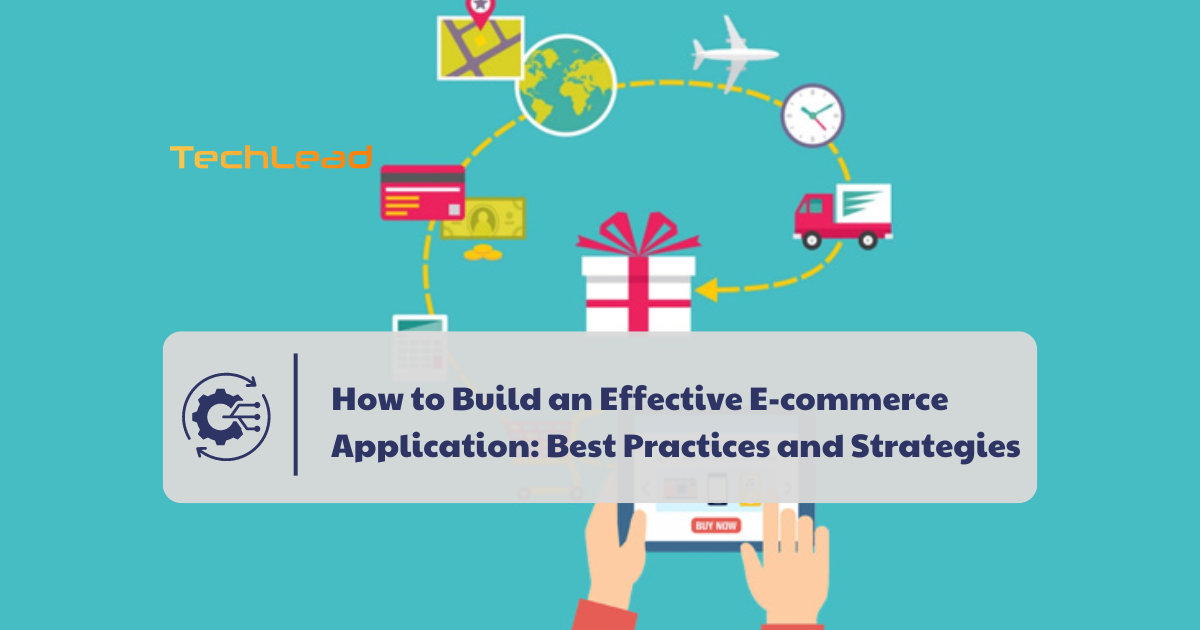Master the art of building a successful e-commerce application with expert strategies and essential tools. Ideal for developers, designers, and entrepreneurs looking to thrive in e-commerce.
1. Why You Need to Build an Effective E-commerce Application
In the digital marketplace, a robust e-commerce application is essential for business success online. It attracts and retains customers, optimizes operations, and drives revenue growth. With enhanced user experience, seamless performance, and robust security, it builds trust and credibility among users.
1.1. Enhancing User Experience in Your E-commerce Application
User experience (UX) is pivotal in differentiating your e-commerce application from competitors. It encompasses every interaction a user has with your platform, from the moment they land on your site to completing a purchase.
Designing intuitive navigation, personalized product recommendations, and a frictionless checkout process are critical. By continuously refining UX based on customer behavior and feedback, businesses can optimize conversion rates and increase customer satisfaction.
1.2. Optimizing Performance of Your E-commerce Application
Performance optimization is crucial for ensuring your e-commerce application can handle high traffic volumes and deliver a seamless user experience.
Techniques such as server-side caching, content delivery network integration, and responsive web design are essential. Monitoring performance metrics like page load times, server response times, and transaction processing speeds helps identify and resolve bottlenecks promptly. A fast and reliable application not only enhances user satisfaction but also boosts search engine rankings and overall site performance.
1.3. Ensuring Security in Your E-commerce Application
Security is paramount in e-commerce applications to protect sensitive customer data, financial transactions, and business reputation. Implementing industry-standard security protocols such as HTTPS encryption, PCI DSS compliance for payment processing, and two-factor authentication safeguards against data breaches and fraud. Conducting regular security audits, patching vulnerabilities promptly, and educating users about online security best practices are essential to maintaining trust and credibility.
2. Essential Features for a Successful E-commerce Application
2.1. Integrate with payment options available in your country
The most important aspect of selling products online is the ability to accept payments from customers. To achieve this, your store needs to integrate payment gateways, which are secure processing systems that transfer funds safely from customers’ bank accounts to the seller’s account.
However, not all payment gateways are compatible with every e-commerce platform. This can pose challenges for store owners who may be unable to use popular payment options due to technical limitations or incompatibility with the country they operate in.
2.2. E-commerce Application features diverse design options.
The e-commerce platform offers a wide range of diverse design options, allowing businesses to customize their storefronts according to brand aesthetics and user preferences. This flexibility ensures that each online store can create a unique and engaging shopping experience tailored to their target audience.
2.3. E-commerce Application ensures strong security measures
The E-commerce Application prioritizes stringent security measures to safeguard user data and transactions. It implements robust encryption protocols, secure authentication methods, and regular security audits to mitigate risks and ensure a secure online shopping environment. This commitment to security helps build trust and confidence among users, fostering a positive and secure shopping experience.
3. Best Methods for Developing an E-commerce Application
In the rapidly evolving digital landscape, developing a successful e-commerce application requires careful planning and strategic implementation.
3.1. Choosing the Right E-commerce Platform for Your Application
Selecting the appropriate e-commerce platform lays the foundation for your online business. Consider factors such as scalability, customization options, integration capabilities, and support for future growth. Popular platforms like Shopify, Magento offer distinct features suited to different business needs, from small startups to large enterprises.
3.2. Integrating Secure Payment Gateways into Your E-commerce Application
Security is paramount in e-commerce, especially concerning payment transactions. Integrating reliable and secure payment gateways ensures customer trust and protects sensitive financial information. Look for gateways compliant with PCI DSS standards, offering encryption and fraud prevention features.
3.3. Optimizing User Experience in Your E-commerce Application
User experience (UX) plays a crucial role in attracting and retaining customers. Focus on intuitive navigation, responsive design, fast loading times, and mobile compatibility. Implement features like personalized recommendations, easy checkout processes, and efficient customer support to enhance user satisfaction and drive conversions.
4. Effective Strategies to Optimize E-commerce Application Performance
Ensuring optimal performance of your e-commerce application is critical for delivering a seamless and satisfying user experience.
4.1. Monitoring Key Performance Metrics in Your E-commerce Application
Monitoring performance metrics is foundational to identifying and addressing issues that could impact user experience and overall application performance. Key metrics to track include:
- Page Load Time: Optimizing page load times is essential for reducing bounce rates and improving user engagement.
- Server Response Time: Faster server responses ensure smoother navigation and transaction processing, contributing to a positive user experience.
- Conversion Rates: Performance optimization often correlates with increased conversion rates, translating into higher sales and revenue.
Utilize tools such as Google Analytics, Pingdom, or New Relic to regularly monitor these metrics and identify areas for improvement.
4.2. Enhancing User Experience for Your E-commerce Application
User experience (UX) directly influences customer satisfaction and retention rates. To enhance UX in your e-commerce application, consider the following strategies:
- Responsive Design: Ensure your application is fully responsive and optimized for various devices, including smartphones and tablets.
- Intuitive Navigation: Simplify the browsing experience by organizing products logically and providing easy-to-use filters and search functionalities.
- Personalization: Implement personalized product recommendations based on user behavior and preferences to enhance engagement and drive conversions.
- Optimized Checkout Process: Streamline the checkout process with fewer steps, guest checkout options, and transparent pricing to minimize cart abandonment rates.
4.3. Implementing Security Measures in Your E-commerce Application
Ensuring the security of customer data and transactions is paramount to building trust and credibility. Implement robust security measures, including:
- SSL Encryption: Secure data transmission with HTTPS protocol to protect sensitive information during transactions.
- Payment Gateway Security: Integrate trusted payment gateways that comply with PCI DSS standards to safeguard financial transactions.
- Regular Security Audits: Conduct routine audits and vulnerability assessments to identify and mitigate potential security threats.
- User Authentication: Enhance account security with strong authentication mechanisms such as two-factor authentication (2FA) to prevent unauthorized access.
5. TechLead: Your Partner for Outstanding E-commerce Application Development Solutions!
TechLead specializes in delivering top-notch e-commerce application development solutions that cater to the unique requirements of modern businesses. Whether you’re launching a new online store or upgrading an existing platform, our team of experts is dedicated to creating robust, secure, and user-friendly applications. We leverage the latest technologies and best practices to ensure your e-commerce solution not only meets but exceeds your expectations, driving growth and maximizing customer satisfaction. Partner with TechLead today to embark on your journey towards e-commerce success.
Contact TechLead today for the best software solutions consultation that helps accelerate your business processes!
Conclude
Building an effective e-commerce application involves choosing the right platform, integrating secure payment gateways, and optimizing user experience. By monitoring performance metrics and implementing strong security measures, businesses can create a reliable and competitive online store. Continuous improvement based on user feedback and technological advancements is essential for long-term success in the digital marketplace.
TECH LEAD – Leading technology solution for you!
Hotline: 0372278262
Website: https://www.techlead.vn
Linkedin: https://www.linkedin.com/company/techlead-vn/
Email: [email protected]
Address: 4th Floor, No. 11, Nguyen Xien, Thanh Xuan, Hanoi





